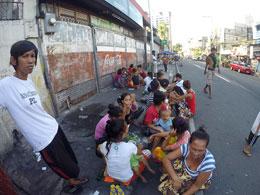"Some of us don't even have a toilet"

Ludy Santos frowned and hushed her crying baby as she discussed dinner with her husband inside their ramshackle home in a garbage dump in Manila's largest slum district of Tondo.
"Instant noodles and bread," said the 34-year-old mother of seven, flashing a toothless smile as she reached for money from a nearby table and her husband left to buy the food.
"Sometimes I'm amazed at how I am able to feed my children," she said. "I'm so afraid that one day we will not have any food."
Santos and her family have been living in Tondo's Barangay Aroma, so called for the stench emitted by the rubbish, for the past 20 years. She and her husband make a living by scavenging for scraps to sell to junkshops.
"It would be nice to live somewhere else, where you don't wake up and sleep to the smell and sight of garbage," she said. "But right now, the important thing is we eat three times a day."
They are among 1.6 billion people in the Asia-Pacific region who still live on less than two dollars a day despite the region being home to the fastest-growing economies in the world.
The gap between the wealthy and the poor has deepened in the region despite decades of strong economic growth, according to various international agencies.
As the Philippines prepares to host the annual leaders' summit of 21 Asia-Pacific Economic Cooperation (APEC) countries this week, activists are calling for discussions on how to help impoverished people like Santos.
"Even with increasing development and bountiful resources, millions are being left behind," said Riza Bernabe, the co-author of a report by Oxfam on rising inequality in Asia.
"Asia needs a new model of economic development" that "puts poor people first" and "does not sacrifice the environment at the altar of productivity or profit," she added.
The Philippines has made "building inclusive economies, building a better world" the theme for this year's APEC summit as it pushes for strategies that would help more people benefit from the region's economic progress.
One of the initiatives proposed by Manila this year is a plan to boost support for small businesses and facilitate their participation in international trade, creating more opportunities for people like Santos.
Bernabe said APEC should also push for greater investments in education and health services, and to promote human rights, empower women, protect the environment and implement pro-poor fiscal policies.
"The focus is too much on trade liberalization," she said.
Erlinda Flores, a 67-year-old grandmother of 24, urged APEC leaders to visit Tondo, just 30 minutes from their main meeting venue, to see for themselves how marginalized people live.
"Why be ashamed of the poor and hide us?" she asked, criticizing reports that homeless people along Manila's streets have been cleared ahead of the APEC summit.
Flores, who put each of her 12 children through school by scavenging garbage for recycling and scrap, and also selling cooked food from a stand, said she would tell the leaders that her family and others do not have legal connections for electricity and water.
"Some of us don't even have a toilet," she said.
More than a quarter of the Philippines' 100 million people are impoverished, according to recent government data, despite the nation having the second fastest-growing economy in the region after China.
Santos was only 15 years old when the Philippines first hosted an APEC leaders' summit in 1996. That was the same year she dropped out of high school to help her family earn money.
Almost two decades later, she said her life is more difficult, with seven children to feed, take care of, and send to school.
The shack she lives in today was built with scrap plywood and iron sheets with holes in them. The family lives on the second floor, as the smelly, swampy ground is covered with trash, rocks and muck.
"This community was new [in 1996] and the roads were paved and the buildings were clean and well-lit," she said. "Garbage was not all over the place. Now, it feels like we've been forgotten."
– DPA
Asia-Pacific Economic Cooperation (APEC)
Asia-Pacific Economic Cooperation (APEC) is an inter-governmental forum that seeks to promote sustainable growth and economic integration, and reduce trade barriers across the Asia-Pacific region.
Commitments made at APEC, established in 1989, are non-binding and decisions are made by consensus, unlike those made at the World Trade Organization.
APEC's 21 member economies account for 40 per cent of the world's population, 47 per cent of world trade, and 57 per cent of global gross domestic product.
The Philippines has made "building inclusive economies, building a better world" the theme for this year's APEC leaders' meeting to highlight the need to bring the benefits of strong growth to more people in the region.
With 1.6 billion people in the Asia-Pacific region still living on less than two dollars a day, one initiative being pushed by Manila would boost support for small businesses to facilitate their participation in international trade.
The goal also aims to bridge the gap between developing and developed APEC economies, Manila said.
The APEC members are Australia, Brunei, Canada, Chile, China, Hong Kong, Indonesia, Japan, South Korea, Malaysia, Mexico, New Zealand, Papua New Guinea, Peru, the Philippines, Russia, Singapore, Chinese Taipei, Thailand, the United States and Vietnam.






